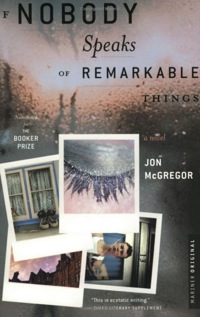 If Nobody Speaks of Remarkable Things
If Nobody Speaks of Remarkable Things
by Jon McGregor
Mariner Books, 2003
275 pages / $13.95 Buy from Powell’s
Rating: 7.3
It’s been close to a decade since Jon McGregor wrote his debut novel If Nobody Speaks of Remarkable Things, published when he was twenty-six. He was the youngest and only first-time novelist to be long-listed for the Booker Prize, and he won both the Betty Trask Award and the Somerset Maugham Award.
In interviews McGregor has said that he was bothered by the public reaction and media frenzy regarding Princess Diana’s death when people die every day (McGregor has said that around the same time as Diana’s death, a man in his own neighborhood was shot dead and the event of which largely went by unnoticed). One life shouldn’t be more valued than another, shouldn’t be considered to be more tragic than another. In response, McGregor wrote If Nobody Speaks of Remarkable Things. Told in an intensely poetic style, the novel centers around the inhabitants of a London street on an ordinary day (the same day as Princess Diana’s death, the date mentioned only once). None of the characters are named, instead identified only by the building in which they live or by personal descriptions, as in “the man with the carefully trimmed moustache” or “in the bathroom of number eighteen, the young man with the dry eyes.” This stylistic choice can be confusing to read at times. However, over the course of the novel as more is given about each character, this problem disappears. We’re told their intimate, heartbreaking stories, and in the process these people become more familiar than if McGregor had chosen to give us names.
Interspersed with these stories is the first-person narration of a woman who recently discovers she is pregnant. Her tale helps as well to anchor the book, and as she begins to come to terms with her unwanted pregnancy we discover how her story fits in relation to all the others.
Like I mentioned, it’s been almost ten years since the publication of If Nobody Speaks of Remarkable Things, but I thought of it again when on July 22nd two terrorist attacks were committed in Norway, taking over ninety lives. The following day, the news media reported British singer Amy Winehouse had died. Despite the multitude of Twitter and Facebook notifications that suggested otherwise, one tragedy does not hold more importance over the other. The scale of one does not give it more weight, just like a celebrity death isn’t granted more significance. Tragedy happens. It happens in big and small ways. Right now, somewhere, there is a war. People are being murdered, raped, brutalized. Right now someone is being diagnosed with cancer. Someone has died, is dying, is experience grief.
Tags: If Nobody Speaks of Remarkable Things, Jon McGregor, Mariner Books

i love this book. i can’t really tell whether the reviewer liked it or not?
I haven’t reread this since it was published, but I remember being awed by the way its style felt both lush and sparse, even ethereal, all at once. It was terrific, right up until the end, which seemed to so badly betray the underlying conceit of taking seriously an “ordinary” tragedy. But I think I’ve been inspired to read it again, and maybe I’ll change my mind.
I can’t tell either.
Did someone at least line-edit this review? I found several mistakes on just the first read that should have been caught and fixed.
“Told in an intensely poetic style, the novel centers around the
inhabitants of a London street on an ordinary day (the is the same day
as Princess Diana’s death, the date is mentioned only once).”
“I thought of it again when on July 22nd two terrorist attacks were
committed in Norway, the total of which taking total over ninety lives.”
“The scale of one does not give it more weight, just like the celebrity of a death does not grant it more significance.”
Do you feel beter now?
I felt fine to begin with. How ’bout you?
I’m good. Thanks for asking.
I’d guess, going by the kinds of mistakes, that they’re not typos, and that “Anonymous” is not a native speaker of English. –but so what? As you suggest, why not an editor? – or was correction rejected?
The fact that the reviewer didn’t bother with a thumbs-up/thumbs-down might be cool with those who are put off by the “Like” operation.
We know at least that Anonymous ‘likes’ the way the story is told, and that the content of the story is quite affecting. I think that that combination = “Like”.
Thanks, whoops, fixed. Though “the celebrity of a death” was arguably deliberate.
Granta had an issue years about how the inhabitants of Great Britain who did NOT feel Princess Diana’s death was reason for overwhelming mourning felt alienated, and eve threatened. Anyone remember that issue? I really got the feeling reading it that Americans probably can’t grasp how that time felt for a British citizen, in that after-wash/undertow following her death.
I sort of liked that one, actually. Just wasn’t sure it was deliberate given the other two. Typos happen.
I had to line-edit 32 reviews one year for an online lit journal and it was a huge pain in the ass. But the authors appreciated it.
“a celebrity death” rather than ‘the death of a celebrity’? I mean that I think the original nouns were simply transposed. ?
The phrasing – of several – that caught my eye with most velcro hooks was “and the event of which largely went by unnoticed”.